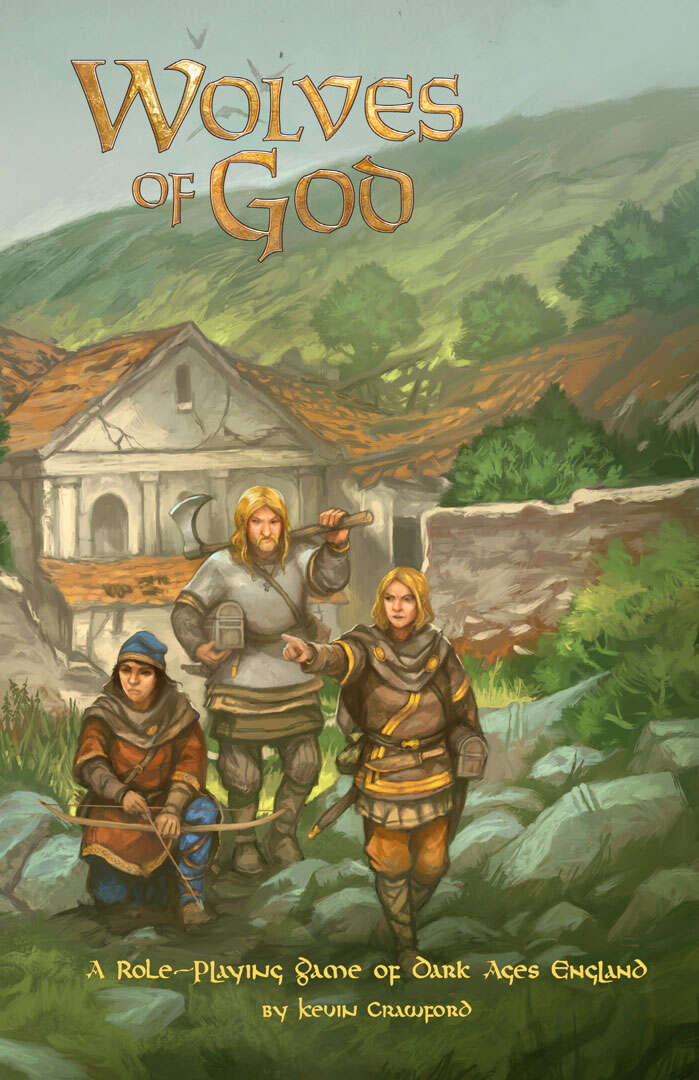I might be getting the chance to run a game that inspires me more than most – Wolves of God by Kevin Crawford. This is similar to the old classic Pendragon in that it is a game that is very strongly set in a particular historical period – and I never thought I’d get any players willing to try this out.
Apparently I was wrong 🙂

So like Pendragon (the Arthurian rpg), Wolves of God is set in a specific time and place. This is a “dark ages” rpg, set in england before the viking invasions, but after the Anglo-Saxon conquest. I know bits about the time period (mainly from studying bits about the Vendels up in scandinavia) but not a whole lot about the English. Some of the norse culture translated across, but unlike the pagan Vendels the English are very much Catholic! You play as an Anglo-Saxon freeman, making your way in the land trying to make a name for yourself. On a cursory read through it seems remarkably close to Stars Without Number or any other of Kevin’s recent games: Basic D&D with some 2d6 skills patched in. Easy enough to run.
But oh boy had I missed the subtle changes that completely change the tenor of this game – and am very much looking forward to trying them out at the table!
XP and coinage – in D&D these are normally linked and work as the encouragement to level… In Wolves there is no real coinage (rather a barter/gift based economy) and you level up by gaining “Glories” and avoiding “Shames” – these are class specific triggers that are all about gaining and loosing prestige in the eyes of the local culture. It ties the characters very closely to the iron age culture of loyalty and religion in what looks like a neat system. You can also gain Glories by making rash promises to lords and then managing to succeed in “poem-worthy way”
Civilisation – unlike normal D&D there are no towns or cities. This is an agrarian society that is spread across the land in small farms and hamlets, and tax is paid in food stuff and goods. Kings don’t have central castles, but need to stay on the move traveling between loyal hamlets trying to avoid starving their subject by eating all the food. The only stone buildings are the “minsters” of the church, and the ruins of the roman-era cities and castles. (which are now full of monsters).
This means there is no “you meet in a tavern” or the like. Adventurers will probably be doing brave deeds for the local clergy! (which might still involve monsters and bandits, so not a complete change!)
Mythic – its a little more straightforward than your normal D&D. In other games I might imagine a scenario of “the haunted castle ruins” that are actually a base for bandits or something. Not here. The ruined castle (caester) actually is full of demons and monsters that need to be turned back by good folk of strong faith. This is a land of god’s miracles and demon curses. The bestiary included is full of very cool creatures that feel somewhat familiar, but different enough to constantly surprise!
Treasure – is a very different experience from D&D. It might look the same (piles of coins, jewels, and artifacts), but it has a very different use. Normally these would be taken out and sold, or used. But in Wolves this sort of thing is way beyond everyday usage of the people – they wont accept gold coins or jewels as they are “useless” to farmers! Adventurers can’t go to a local general store and sell off things to get food or accommodation. The artifacts are also a dangerous proposition (the devil’s work) – even using them can bring Shame to some classes (and makes levelling even harder!). The only people who appreciate this stuff are the nobility and clergy, and you need to offer them as gifts to get on their good side. Making useful friends and being loyal to a lord is much much more important in Wolves. As those lords and clergy are pretty much the only people you can get expensive things from (like swords, armor, horses, or specialised services!)
Of course this is a Kevin Crawford product – and so has all the wonderful tables for generating Minsters and Caesters. But the whole feel of this game is radically different from your bog standard D&D. I don’t think many existing modules would make much sense in this setting – the motivations of the adventurers would be totally wrong in so many cases. The only game I’ve had experience with that comes close might be “Pendragon”, but Wolves of God is much less fiddly! This feels like an alien culture and world that I am excited to get the chance to enter!
HWÆT!
LikeLike
And I’m sure the players will twist it and change it and make it unrecognizable.
It is quite nice, though, I agree. A bit challenging – I want to make it more Beowulf, less BX chassis. But that’s just my usual inclinations talking.
LikeLike
oh yes. it will definitely lean towards Beowulf and many of the Sagas – Glories, Shames, Gifting, Splendor will all push in that direction. Thats even before getting into the background, the rules for wealth (land ownership, taxes, etc)
LikeLike